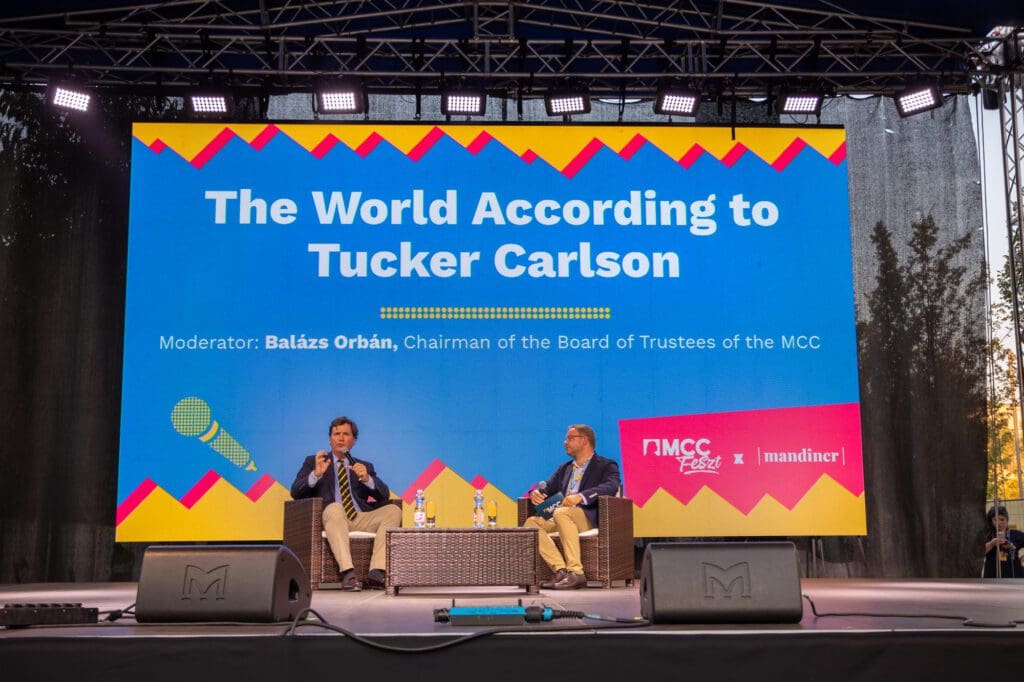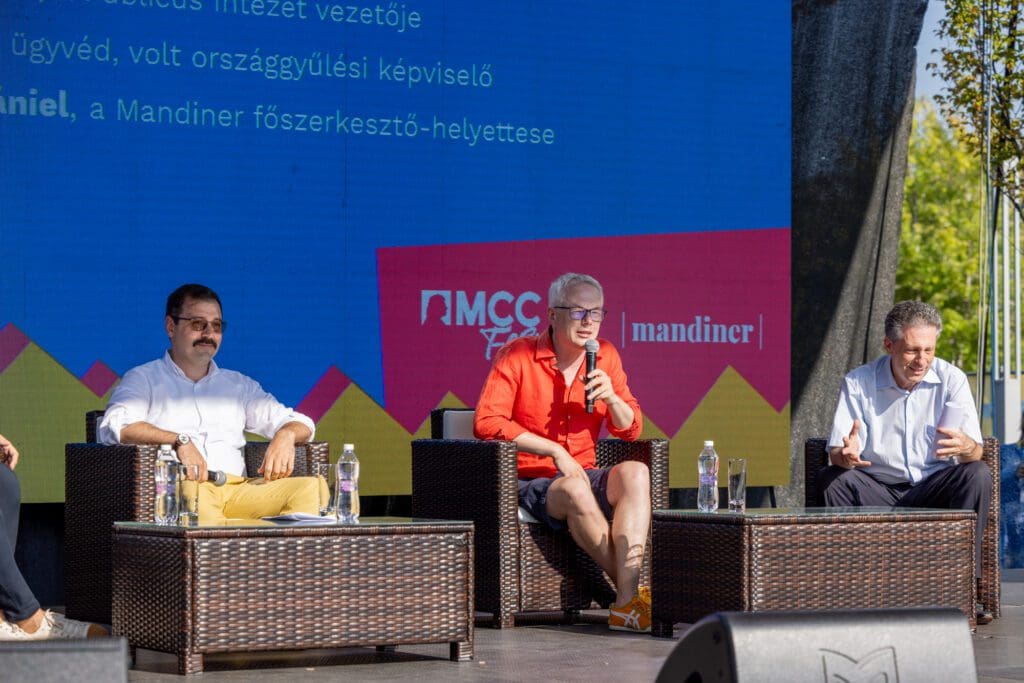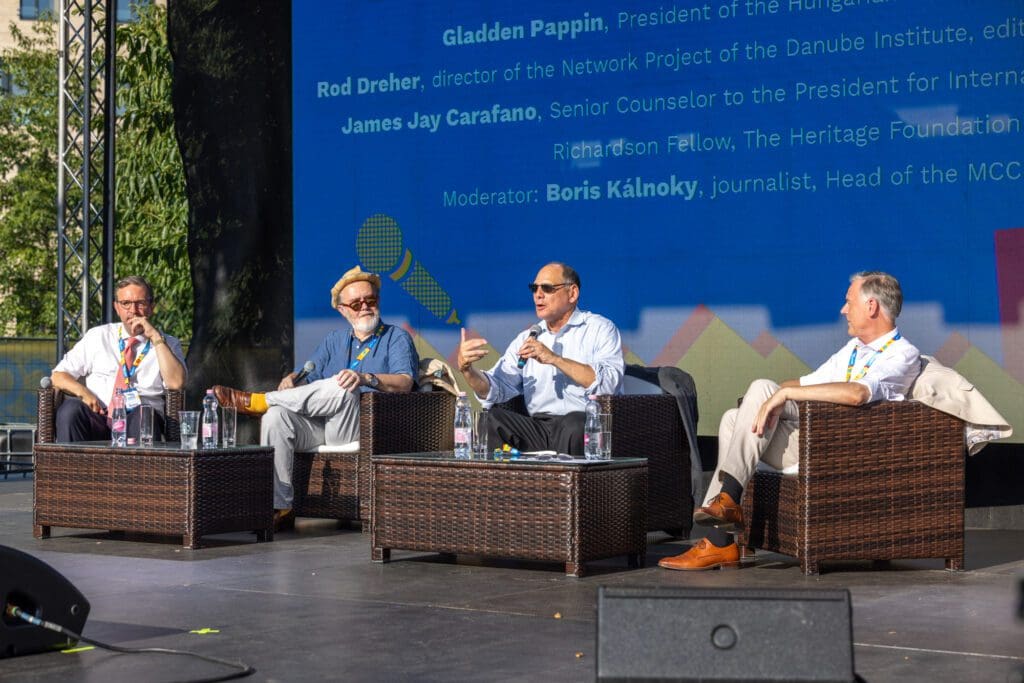The following is largely based on a translation of a press release kindly provided to us by the Mathias Corvinus Collegium.
Tucker Carlson, the legendary former TV host for Fox News and journalist who now mainly publishes on social media, started his speech at the MCC Feszt After at Millenáris Park in Budapest by complementing the Hungarian cuisine, then told the audience that the Hungary of today is like the United States he grew up in in the 1980s. Carlson believes that Hungary is being criticised often because it is holding onto its Christian values. He went on to lambast US Ambassador to Hungary David Pressman who he believes is not serving the interest of American citizens.
Regarding the Russo-Ukrainian war, he stated that the Western media is painting a false picture of the state of the conflict, suggesting that the Ukrainian army is poised to win. However, in reality, the two nations’ respective population sizes alone would make Russia the likely victor in the conflict, let alone its military-industrial capacity.
In the discussion following the lecture, MCC Chairman of the Board of Trustees Balázs Orbán asked Tucker Carlson what advice he would give to today’s youth, such as the large number of students attending the event. According to Carlson, they should read print books, every day if possible. He believes that schools change, today’s colleges have become ‘godless places’, but books stay the same: good books help you decide what’s true and what’s not true.

The next question inquired about what advice he would give to his own younger self. Carlson replied
‘Don’t be arrogant. Don’t think you know everything, don’t think you’re always right, and don’t judge so fast’.
It’s easy to judge, he continued, but it is impossible to understand what is happening in another person’s marriage. How could we expect to understand what is happening in another country then? We have to concede that we cannot know everything, and cannot understand everything. With this disposition, we will be wiser than President Biden and his administration, or Ambassador Pressman, who have the attitude of ‘I know what’s good for you’, Carlson concluded.
Fervent Debate on Public Affairs at the First Panel Discussion

The first panel discussion of the event was titled ‘The Transforming World Order, Hungary’s Place in the World’. During the discourse, lawyer and former LMP Chairman and Member of Parliament András Schiffer said we cannot judge whether or not a certain event was a turning point in history until 10 or 20 years pass.
András Pulai, head of the Publicus Institute, a left-leaning social research organisation, on the other hand, believes that 24 February 2022 will go down in history as a turning point, as it was the first time since World War II that a large power showed this level of aggression towards a smaller nation. However, he also agreed with Schiffer that it is a part of a larger process as well, the implications of which can only be understood decades after. Pulai also shared his unusual opinion that Russia will not only lose the war, but President Putin will also lose power and Russia will be broken up into smaller republics, such as Chechnya and Tatarstan. This was the first but not the last time he drew jeers from the audience.
Miklós Szánthó, Director General for the Center for Fundamental Rights, thinks that the current conflict could have been confined to a local level, just like it happened with Crimea in 2014.
The rearrangement of the global power hierarchy has begun,
he declared. The United States is no longer the hegemonic great power, many international powers are interested in having a say in how the current transforming power structure of the world shapes up. It would be dangerous to detach Russia from Europe, he added, therefore the Hungarian government’s stance towards the war is much more in the international public interest than that of Brussels.
‘Forbidden to Forbid’ — Foreign Experts About the Culture Wars
According to Gladden Pappin, President of the Hungarian Institute of International Affairs, the culture wars are actually being fought between culture and anti-culture. He went on to explain that Christianity and conservatism have always prioritised the maintaining of normalcy, a functioning society. He believes this is exactly what the left is rebelling against today.
Rod Dreher, Director of the Network Project at the Danube Institute, believes this phenomenon can be traced all the way back to the sexual revolution of the 1960s, one of the main mottos of which was ‘it’s forbidden to forbid’. The right wing tends to think that culture will take care of itself without any intervention, a Reaganesque attitude. However, this idea has proven to be false, proper culture cannot be upheld this way, still according to Dreher.
Conservatives have to answer two questions, James Jay Carafano, chief advisor to the Heritage Foundation, opined. Carafano believes that the roles of the political sides have switched places in recent years. Nowadays, it is the left who is representing the interest of the elite, while everyday people wanting change have found their home on the right.

The expert panellists all agreed that figures like Christopher Rufo or Tucker Carlson have a unique influence, and, in many cases, can achieve greater political change than the US Congress. They all spoke of Hungary in high regard, stressing the role of the Mathias Corvinus Collegium, which gives voice to the conservatives. They were also in agreement that such a voice is painfully missing from American public life today.
The discussions were followed by spirited summer evening concerts. MCC student András Csomor Nagy and his band, as well as the musical ensemble Parno Graszt performed to great reception from the audience.
Related articles:







